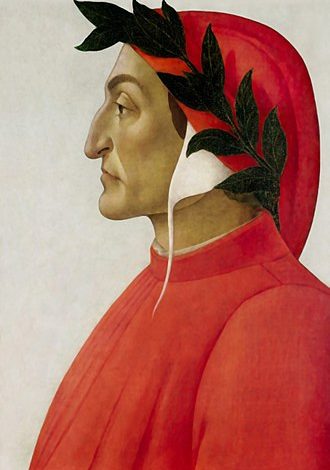Dante Alighieri

Dante Alighieri (Italian: [ˈdante aliˈɡjɛːri]), probably baptized Durante di Alighiero degli Alighieri[note 1] and often referred to simply as Dante (/ˈdɑːnteɪ, ˈdænteɪ, ˈdænti/,[2][3] also US: /ˈdɑːnti/;[4] c. 1265 – 1321), was an Italian poet, writer and philosopher.[5] His Divine Comedy, originally called Comedìa (modern Italian: Commedia) and later christened Divina by Giovanni Boccaccio,[6] is widely considered one of the most important poems of the Middle Ages and the greatest literary work in the Italian language.[7][8]
Dante is known for establishing the use of the vernacular in literature at a time when most poetry was written in Latin, making it accessible only to the most educated readers. His De vulgari eloquentia (On Eloquence in the Vernacular) was one of the first scholarly defenses of the vernacular. His use of the Tuscan dialect for works such as The New Life (1295) and Divine Comedy helped establish the modern-day standardized Italian language. His work set a precedent that important Italian writers such as Petrarch and Boccaccio would later follow.
Dante was instrumental in establishing the literature of Italy. His depictions of Hell, Purgatory and Heaven provided inspiration for the larger body of Western art and literature.[9][10] He is cited as an influence on such English writers as Geoffrey Chaucer, John Milton and Alfred Tennyson, among many others. In addition, the first use of the interlocking three-line rhyme scheme, or the terza rima, is attributed to him. He is described as the “father” of the Italian language,[11] and in Italy he is often referred to as il Sommo Poeta (“the Supreme Poet”). Dante, Petrarch, and Boccaccio are also called the tre corone (“three crowns”) of Italian literature.
Not much is known about Dante’s education; he presumably studied at home or in a chapter school attached to a church or monastery in Florence. It is known that he studied Tuscan poetry and that he admired the compositions of the Bolognese poet Guido Guinizelli—in Purgatorio XXVI he characterized him as his “father”—at a time when the Sicilian School (Scuola poetica Siciliana), a cultural group from Sicily, was becoming known in Tuscany. He also discovered the Provençal poetry of the troubadours, such as Arnaut Daniel, and the Latin writers of classical antiquity, including Cicero, Ovid and especially Virgil.[18]
Dante’s interactions with Beatrice set an example of so-called courtly love, a phenomenon developed in French and Provençal poetry of prior centuries. Dante’s experience of such love was typical, but his expression of it was unique. It was in the name of this love that Dante left his imprint on the dolce stil novo (sweet new style, a term which Dante himself coined), and he would join other contemporary poets and writers in exploring never-before-emphasized aspects of love (Amore). Love for Beatrice (as Petrarch would express for Laura somewhat differently) would be his reason for poetry and for living, together with political passions. In many of his poems, she is depicted as semi-divine, watching over him constantly and providing spiritual instruction, sometimes harshly. When Beatrice died in 1290, Dante sought refuge in Latin literature.[19] The Convivio chronicles his having read Boethius’s De consolatione philosophiae and Cicero’s De Amicitia.
He next dedicated himself to philosophical studies at religious schools like the Dominican one in Santa Maria Novella. He took part in the disputes that the two principal mendicant orders (Franciscan and Dominican) publicly or indirectly held in Florence, the former explaining the doctrines of the mystics and of St. Bonaventure, the latter expounding on the theories of St. Thomas Aquinas.[16]
At 18, Dante met Guido Cavalcanti, Lapo Gianni, Cino da Pistoia and, soon after, Brunetto Latini; together they became the leaders of the dolce stil novo. Brunetto later received special mention in the Divine Comedy (Inferno, XV, 28) for what he had taught Dante: Nor speaking less on that account I go With Ser Brunetto, and I ask who are his most known and most eminent companions.[20] Some fifty poetical commentaries by Dante are known (the so-called Rime, rhymes), others being included in the later Vita Nuova and Convivio. Other studies are reported, or deduced from Vita Nuova or the Comedy, regarding painting and music.[citation needed]
